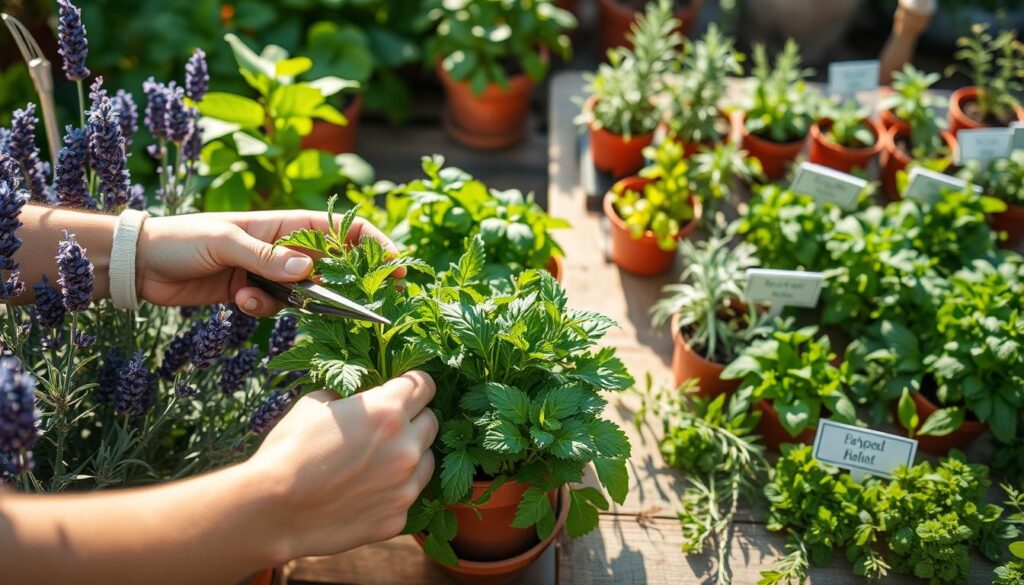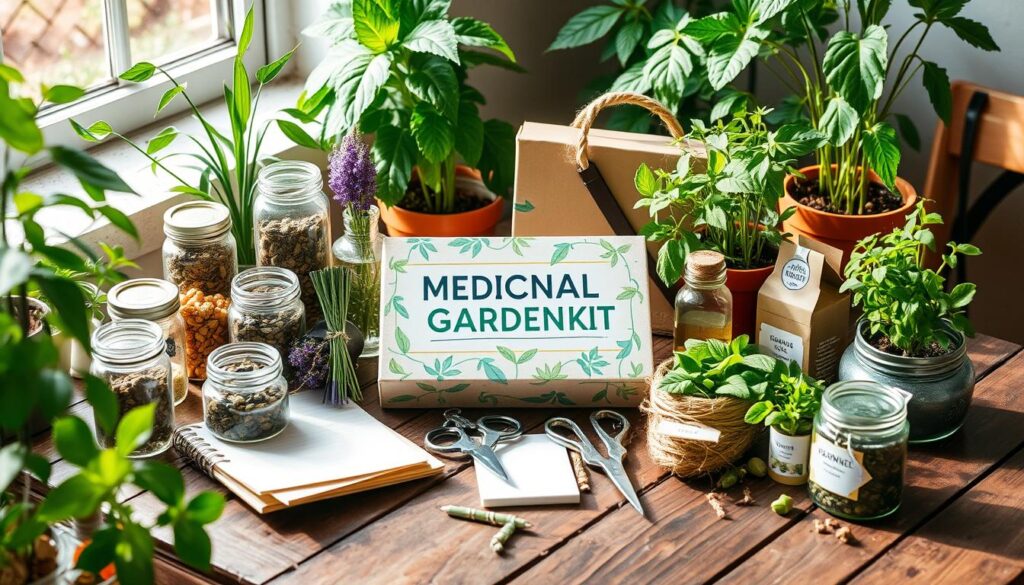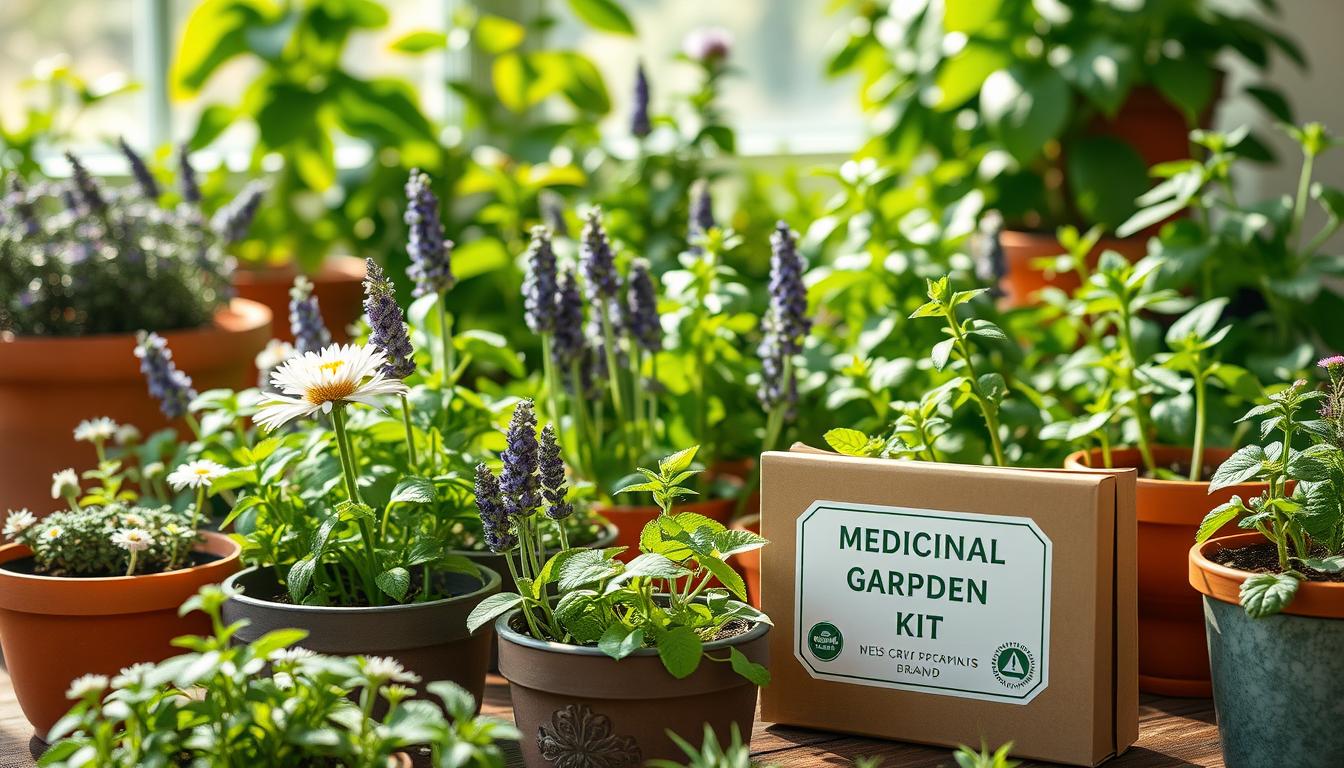Growing your own medicinal herb garden is great for your health and well-being. You’ll have natural remedies right at your fingertips. Plus, you’ll save money and help the planet. This guide will show you how to start a medicinal herb garden, focusing on Natural garden remedies. You’ll learn about choosing the right herbs, harvesting, and using them for health.
It doesn’t matter if you’re new to gardening or have been doing it for years. You’ll find tips and tricks to make your own diy herbal medicine kit. You’ll see how to use natural garden remedies in your everyday life.
“Unlock the healing power of nature—start growing your own medicinal herbs today with this easy-to-use garden kit!”
Key Takeaways
- Grow your own medicinal herbs at home for natural remedies and cost savings
- Cultivate a sustainable, eco-friendly diy medicinal garden kit for wellness
- Learn techniques to harvest and preserve your homegrown herbal remedies
- Discover how to create your own diy herbal medicine kit from your garden
- Explore the benefits of incorporating natural garden remedies into your lifestyle
The Benefits of Growing Your Own Medicinal Herbs
Growing your own medicinal herbs at home has many benefits. You’ll have a steady supply of natural remedies right in your garden. This method is cost-effective and sustainable. By growing the herbs you need, you can cut down on store-bought supplements and medications.
Natural Remedies at Your Fingertips
With your own medicinal herbs, you can grow the exact plants you need for your health. Whether you’re looking for organic pest control, homemade fertilizers, or natural weed control, your garden can be full of biodiversity and beneficial insects.
Cost-Effective and Sustainable
Looking after your own medicinal herb garden is a smart way to save money and live healthier. It cuts down on your need for commercial products. Plus, using composting techniques in your garden makes the soil richer, helping your plants grow better.
“Growing your own medicinal herbs allows you to take control of your health and well-being, while also promoting a more sustainable and eco-friendly lifestyle.”
Choosing the Right Herbs for Your Garden
Building your own medicinal herb garden is exciting. It’s important to pick the right plants. These herbs not only help with health but also grow well in many places. They’re great for both new and experienced gardeners.
We suggest lavender, chamomile, and peppermint as easy-to-grow options. These plants are beautiful and have healing properties. Lavender helps calm you down, while chamomile reduces inflammation and helps you sleep well.
Think about your garden’s climate, sun, and space when choosing herbs. Rosemary and thyme love full sun and good drainage. Echinacea and lemon balm do well in the shade. Picking the right herbs for your garden’s conditions ensures a good harvest of natural remedies.
“Transform your backyard into a natural remedy haven with the Medicinal Garden Kit—perfect for beginners!”
Here are some tips for your medicinal herb garden:
- Choose a mix of annuals and perennials for a longer harvest
- Plant herbs together to keep pests away and help each other grow
- Start with seedlings or transplants to get a head start
- Water and drain the soil well to keep your herbs healthy
Follow these tips and pick the best herbs for your garden. You’ll soon have a garden full of natural remedies right at your fingertips.
| Herb | Medicinal Uses | Growing Conditions |
|---|---|---|
| Lavender | Anxiety relief, sleep aid, anti-inflammatory | Full sun, well-draining soil |
| Chamomile | Anti-inflammatory, digestive aid, wound healing | Full sun to partial shade, moist, well-draining soil |
| Peppermint | Digestive aid, headache relief, natural decongestant | Partial shade, moist soil |
| Rosemary | Cognitive enhancement, anti-inflammatory, antimicrobial | Full sun, well-draining soil |
| Echinacea | Immune system support, anti-inflammatory, wound healing | Full sun to partial shade, well-draining soil |
“Growing your own medicinal herbs is a powerful way to connect with nature and take control of your health. The plants in your garden can become your personal pharmacy.”
Preparing Your Garden Space
Creating the perfect spot for your medicinal herb garden is key. It helps your plants grow well and gives you the natural remedies you want. Let’s look at the main steps to get your garden ready.
Soil Requirements
Your garden’s soil is crucial for your medicinal herbs. Go for soil that drains well and is full of nutrients. It should have a pH between 6.0 and 7.0, which is best for most herbs.
Add organic stuff like compost or aged manure to make the soil better. This improves its texture and how well it drains.
Sunlight and Drainage
Most medicinal herbs need at least 6 hours of sunlight a day. Make sure you know how much sun each herb needs. Arrange your garden so it gets the right amount of light.
Good drainage stops waterlogged soil, which can harm your plants. Use raised beds or create them to help with drainage. This keeps water from pooling and rotting roots.
Think about your garden’s layout to make it work well. Put plants that need the same sunlight and soil together. This makes your garden look good and helps your herbs grow better.
This smart medicinal garden layout boosts your garden’s look and your plants’ health and productivity.
Planting and Caring for Your Medicinal Herbs
Starting a medicinal herb garden needs careful planning and upkeep. You can begin with seeds or move seedlings to your garden. The goal is to give your herbs the best chance to grow strong and healthy.
Sowing Seeds or Transplanting Seedlings
You can either plant seeds directly or move seedlings to your garden. Starting with seeds lets you see your herbs grow from the beginning. Moving seedlings gives them a jumpstart on growing.
Choose the right planting method for each herb, considering depth, spacing, and sunlight. Planting some herbs together can help them grow better. This is called companion planting.
“Looking for a natural way to boost your health? Grow your own medicinal plants at home with this all-in-one garden kit!”
Watering and Fertilizing
Watering your herbs right is key to their health. Don’t overwater, as it can cause root rot. Keep the soil moist but not too wet, adjusting as the weather and herb types change.
Feeding your herbs with the right food is also crucial. Use natural, organic fertilizers for balanced growth and healthy leaves. Adding homemade compost or aged manure to your soil is great. It brings important minerals and organic stuff to your plants.
By taking good care of your medicinal herbs, you’ll soon have a garden full of natural remedies. This way, you’ll have what you need for health and wellness right in your own garden.
Natural Garden Remedies
Growing your own medicinal herbs lets you make natural garden remedies. You can tackle common garden problems like pests and weeds in a green way. This approach is good for the planet.
Homemade Herbal Remedies for Pest Control
Many medicinal herbs can keep insects away naturally. For example, lavender, peppermint, or marigolds can keep pests away from your garden. You can make your own pest control by steeping these herbs in water and spraying it on your plants.
Organic Weed Control with Medicinal Plants
Weeds can be tough to deal with, but some herbs can help. Plants like chamomile and clover can control weeds naturally. Use these herbs to make a mulch or compost that stops weeds from growing.
| Herb | Natural Pest Control | Organic Weed Control |
|---|---|---|
| Lavender | ✓ | |
| Peppermint | ✓ | |
| Marigolds | ✓ | |
| Chamomile | ✓ | |
| Clover | ✓ |
Using homemade herbal remedies in your garden makes it safe and beautiful. These remedies help you avoid harmful chemicals and pesticides. Your medicinal herbs can be your garden’s best friends.
“Embrace the power of nature and let your medicinal herbs work their magic in your garden.”
Harvesting and Preserving Your Herbs
Harvesting and preserving your medicinal herbs is key to keeping them potent and fresh. Whether you have a big herb garden or a few plants, knowing how to harvest and preserve them is important. This knowledge lets you enjoy their health benefits all year.
Proper Harvesting Techniques
Timing is everything when it comes to harvesting herbs. Harvest them in the morning, after the dew has dried and before it gets too hot. This keeps the essential oils that give herbs their smell and health benefits.
Use clean, sharp scissors or pruners to cut the leaves, stems, or flowers. Be careful not to hurt the plant.
- Harvest leaves and stems just before the plant flowers for the best flavor and potency.
- Collect flowers when they are fully open and vibrant in color.
- Avoid harvesting herbs during or shortly after rain or heavy watering to prevent mold and mildew.
Drying and Storing Methods
After harvesting, drying and storing your herbs right is key to keeping their health benefits. Air-drying is a common method. Hang the herbs in a cool, dark place with good air flow. Or, use a dehydrator on a low setting to dry them faster.
Once dry, store your herbs in airtight containers like glass jars or resealable bags. Keep them away from direct light and heat. Label each container with the herb name and harvest date. This helps you keep track of your herbs and use the freshest ones in your remedies.
“Discover the joy of cultivating healing herbs right at your doorstep—get your Medicinal Garden Kit now!”

| Herb | Ideal Harvesting Time | Drying Method | Storage Conditions |
|---|---|---|---|
| Lavender | Just before blooming | Air-dry in bunches | Airtight containers, away from light |
| Peppermint | Just before flowering | Dehydrate at low temperature | Resealable bags, cool and dark place |
| Echinacea | When flowers are fully open | Air-dry in single layers | Glass jars, cool and dry location |
By following these steps for harvesting and preserving herbs, you can keep your medicinal herbs fresh and potent. This way, you can enjoy the health benefits of your homegrown plants all year.
Using Your Homegrown Herbs for Wellness
Growing your own medicinal herb garden opens up a world of natural wellness. You can make soothing teas and nourishing salves from the herbs you care for. These can support your health and well-being.
Herbal Teas and Infusions
Herbal teas and infusions are simple and fun ways to use your homegrown herbs. You can enjoy a calming chamomile tea or a refreshing peppermint drink. These teas offer many benefits, like easing digestive issues, reducing anxiety, and helping you sleep better.
Topical Applications and Salves
Your herbs can also be used on the skin and muscles. Herbs like lavender, calendula, and St. John’s Wort can be mixed into oils and beeswax. This makes soothing balms and ointments. These can ease inflammation, lessen pain, and help heal skin issues like eczema and minor burns.
Using your homegrown herbs can bring you many natural wellness solutions. It lets you take a holistic approach to your health. This can make you feel empowered and in control of your well-being.
Creating Your Own DIY Herbal Medicine Kit
Making your own DIY herbal medicine kit is a rewarding journey. You can use the herbs from your garden to make homemade herbal remedies. These remedies can help with many health issues.
Building your natural first aid kit is both useful and satisfying. With simple recipes and methods, you can turn your herbs into various products. These include soothing tinctures, salves, infusions, and ointments.
Stocking Your Herbal Medicine Kit
Start by adding these key herbs to your kit:
- Calendula: It’s great for healing wounds and reducing inflammation. Use it to make salves and balms.
- Echinacea: This herb boosts the immune system. Add it to tinctures and teas.
- Lavender: Known for calming effects, lavender is perfect for making sprays and skin products.
- Peppermint: Its fresh scent and soothing qualities make it ideal for herbal oils and syrups.
- Chamomile: Great for teas, compresses, and facial steams, chamomile soothes the skin.
With these herbs in your kit, you’ll have many natural remedies ready. They can help keep your family healthy and happy.
| Herb | Benefits | DIY Herbal Products |
|---|---|---|
| Calendula | Anti-inflammatory, wound-healing | Salves, balms |
| Echinacea | Immune-boosting | Tinctures, teas |
| Lavender | Calming, relaxing | Sprays, skin care |
| Peppermint | Soothing, refreshing | Herbal oils, syrups |
| Chamomile | Versatile, calming | Teas, compresses, facial steams |
Using these herbs, you can make a versatile DIY herbal medicine kit. It puts nature’s healing power at your fingertips. Enjoy making your own homemade herbal remedies and feel secure with a natural first aid solution.
“Take control of your wellness with this DIY medicinal herb kit—ideal for anyone wanting a natural approach to health.”

Tips for Beginners
If you’re new to growing medicinal herbs, don’t worry – we’ve got you covered! Starting a medicinal herb garden is rewarding and empowering. With the right tips, even beginners can grow a garden full of natural remedies.
First, pick the right herbs for your climate and growing conditions. Growing medicinal herbs for beginners means choosing plants that are easy to care for. Great options include lavender, chamomile, peppermint, and echinacea.
- Start small and focus on a few herbs at a time. It’s better to have a small, well-kept garden than a big, neglected one.
- Pay close attention to soil and sunlight needs. Each herb has its own best conditions, so research what yours need.
- Be patient and let your herbs grow. Medicinal herb gardening tips suggest waiting 4-6 weeks for seeds to germinate and a few months for plants to grow fully.
- Try different planting methods, like direct sowing or transplanting seedlings, to see what works best in your starting a medicinal herb garden.
The joy of growing your own medicinal herbs is in the journey. With time, effort, and these tips, you’ll soon have a thriving garden of natural wellness at home.
| Medicinal Herb | Benefits | Growing Conditions |
|---|---|---|
| Lavender | Stress relief, anxiety reduction, sleep aid | Full sun, well-drained soil |
| Chamomile | Anti-inflammatory, digestive aid, skin soothing | Full sun, moist but well-drained soil |
| Peppermint | Digestive aid, pain relief, respiratory support | Partial shade, moist soil |
| Echinacea | Immune system booster, anti-viral properties | Full sun, well-drained soil |
Conclusion
Growing your own medicinal herb garden at home has many benefits. You’ll have a steady supply of natural remedies, save money, and create a garden that’s good for the planet. This guide will help you make a garden full of medicinal herbs and make your own herbal medicine at home.
Whether you’re experienced or new to gardening, this article will show you how to use nature’s power. You’ll learn about natural wellness solutions and how to save money and be kind to the earth. Growing your own DIY herbal medicine is a great choice.
So, why not begin your own medicinal herb garden now? With the right knowledge and some care, you can turn your outdoor area into a place full of natural remedies and holistic wellness.
“Grow nature’s pharmacy in your own backyard! Get your Medicinal Garden Kit and start reaping the benefits of homegrown herbal remedies.”
FAQ
What are the benefits of growing your own medicinal herbs at home?
Growing your own medicinal herbs at home has many perks. You get a steady supply of natural remedies, save money, and create a green garden. Plus, you can make your own herbal medicine kit and boost your health with fresh herbs.
What are some of the best herbs to grow for medicinal purposes?
Great herbs for health include easy-to-grow types like chamomile, lavender, peppermint, and echinacea. These are perfect for beginners because they grow well in many conditions.
How do I prepare my garden space for growing medicinal herbs?
To get your garden ready, make sure the soil is right, it gets enough sun, and drains well. The guide will help you test your soil, set up the best environment, and arrange your herbs for the most growth.
How do I care for my medicinal herbs once they’re planted?
Looking after your herbs means watering, feeding them, and using companion planting. You’ll learn how to plant seeds, move seedlings, and keep your herbs healthy and strong.
How can I use the medicinal herbs I grow in my garden?
You can turn your herbs into natural remedies like herbal teas, infusions, creams, and salves. The guide will show you how to use your garden’s herbs to improve your health.
What tips do you have for beginners starting a medicinal herb garden?
For new gardeners, the guide gives lots of advice. It covers choosing the right plants for your area, learning about herb care, and fixing common issues. This will help beginners grow a successful medicinal herb garden.
